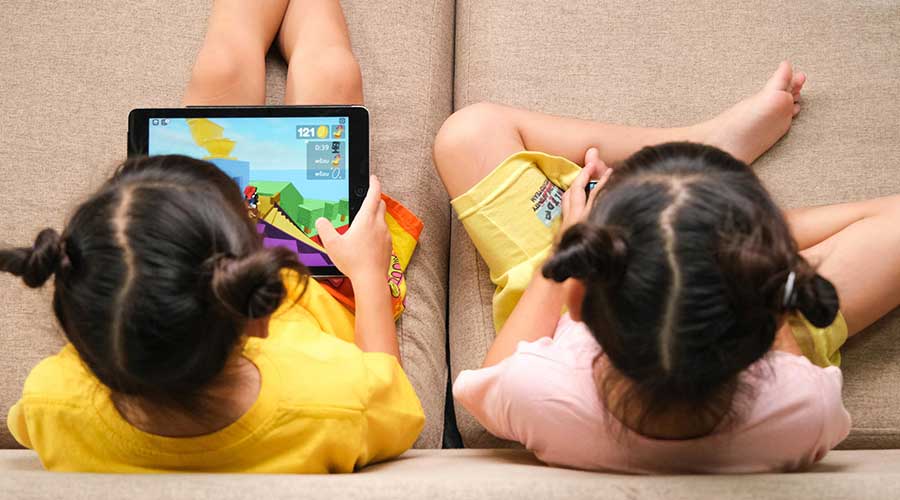9 ACTIVITIES TO IMPROVE YOUR TODDLER'S DEVELOPMENT
- 20 Apr - 26 Apr, 2024
Pediatricians are alarmed that babies and toddlers who spend hours a day on phones, tablets, and around TVs can develop autistic-like symptoms, in a newly-identified condition termed Virtual Autism. The good news: the symptoms of Virtual Autism often disappear when the children stop all screen exposure and switch to face-to-face contact, reading, and playing with care-givers, other children, and non-electronic toys.

Screen viewing several hours a day prevents the brain from developing and generates behavior problems and relationship problems. Over the preceding five years, the doctors had noticed more and more toddlers with unusual changes in behavior. Some had stopped responding to their names, they would avoid eye contact, and had become indifferent to the world around them – characteristics of Autistic Spectrum Disorder (ASD). Others were developmentally behind for their age.
After asking parents in detail about the kids’ media use and household exposure, the doctors discovered almost all the children had spent large amounts of time on and around screens – in some cases, ten hours a day. But when the doctors had families eliminate or greatly reduce the children’s screen exposure, the ASD symptoms would almost always disappear.
Various studies in Romania have come to similar conclusions, one stating “sensory-motor and socio-affective deprivation caused by the consumption of more than 4 hours/day of virtual environment can activate behaviours and elements similar to those found in children diagnosed with ASD.
Because this phenomenon has been so often observed in Romania, screen withdrawal there is now a therapeutic protocol for early
ASD and a campaign is also underway there to inform parents about the problem.
Meanwhile, a study released in 2022 of more than 84,000 Japanese babies and their mothers found that “among boys, longer screen time at 1 year of age was significantly associated with autism spectrum disorder at 3 years of age. With the rapid increase in device usage, it is necessary to review the health effects of screen time on infants and to control excessive screen time.”

So, what’s a parent to do? For one thing, to respect a child’s basic developmental needs. For kids to learn to speak, reason, and develop crucial social skills, they need face-to-face interaction with loving people and to use all their senses as often as they can. A new study from Iran proves the power of parent interaction and play. Investigators selected 12 toddlers with autistic-like symptoms who had spent half their waking hours on screen devices. Their parents were then given 8 weeks of lessons in how to play with their children, with an emphasis on eye-to-eye contact, loving touch, and continuous communication. While the parents applied these lessons at home, objects that had absorbed the children’s attention were taken away, including digital devices. At the end of the two-month period, the children’s screen time had shrunk to a bare minimum, their ASD-like repetitive behaviors were greatly reduced, and brain studies showed ASD-like readings had returned to nearly normal For the intervention to work, the parents had to stick with high-touch, high-talk interaction all day every day during the children’s waking hours. Researchers can now confidently recommend that children under age three should spend their time playing and interacting face-to-face with caring adults and not using digital devices. The American Academy of Pediatrics agrees that babies and toddlers should have no solo use of screens. Screen interaction should be limited to video calls with loved ones, with a caregiver standing by. Preschoolers shouldn’t have more than one hour of screen time a day to allow children ample time to engage in other activities important to their health and development. The World Health Organization agrees that, for the sake of their health and proper brain formation, children under age one should have no exposure to screens. So kids can stay on a healthy developmental track, experts recommend that you should talk and read with your child every day as much as possible. Provide materials, toys, and games that require manipulation, such as a play dough, finger paints, and a play kitchen. Go outside at least once a day and make sure the child has time to play alone and with other children. Not use screens when you are with children. Not hand a phone to your baby or young child (and keep the screen locked, just in case). Keep the TV off around kids under age four, even if the child doesn’t seem to be paying attention to what’s on the screen. Explain to family members and caregivers why these measures are essential to a child’s healthy development, durability, and well-being.
COMMENTS